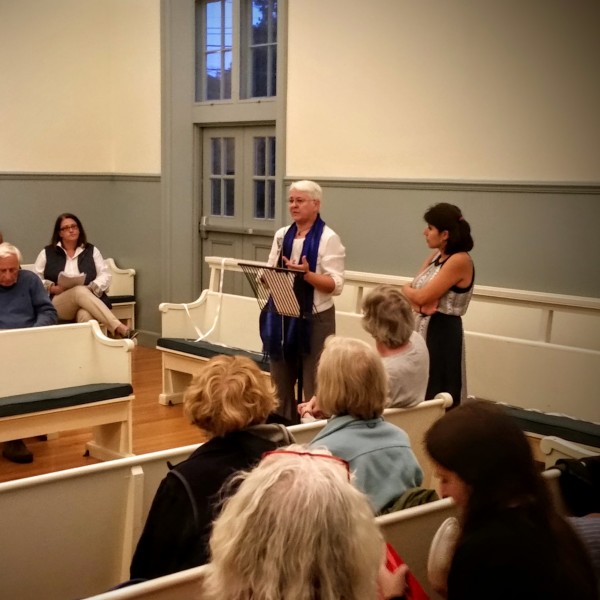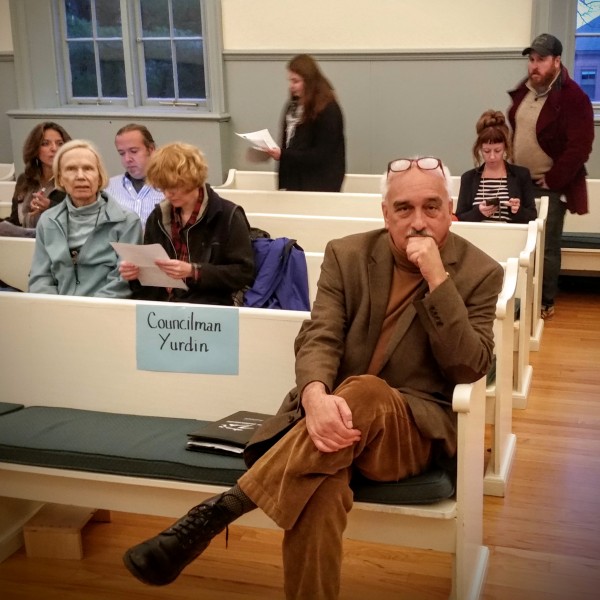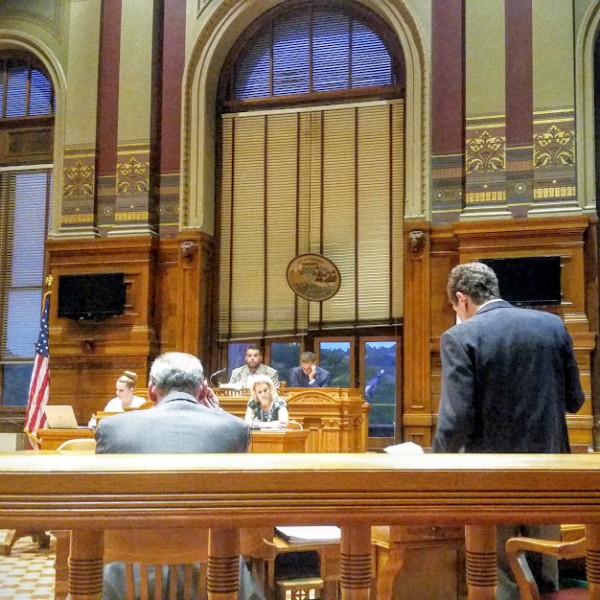
Providence Mayor Jorge Elorza attended an East Side forum on the Community Safety Act (CSA), saying that despite some differences, he doesn’t “think it will be a problem getting this done before the end of the year.”
East Side City Councillors Kevin Jackson and Sam Zurier were in attendance. Councillor Seth Yurdin was out of town. While Jackson is fully in support of the CSA, Zurier and Yurdin have both publicly registered doubts.
After Elorza heard the speakers below, he spoke about his own encounters with the police, due to racial profiling. Though in broad agreement with the CSA, Elorza did outline some points of disagreement, including issues around the use of canines in policing, requesting proof of ID from juveniles, a prohibition against photographing juveniles, the eradication of the gang identification database and concerns that a “community safety review board” clashes with the police officers bill of rights.
On the gang database, Elorza believes that there will be a way to make the process more open, so that people will be able to have some measure of oversight. He also feels that there may be ways to craft policies that will satisfy both sides of the issue.
“There are many more places where there is agreement than disagreement,” said Elorza, “and on the areas where there are disagreements, I still remain very hopeful.”
There was little doubt that the community members in attendance were squarely behind the CSA. Nine residents spoke passionately about the need for expanded oversight of the police. Resident Don Baier told a very personal story of when he called the police to help find his sister, who was roaming the streets, delusional. Because of the excellent work of the police, his sister was recovered unharmed and received treatment. Not everybody has such positive interactions with the police, said Baier. He wishes that “every neighborhood could get the same kind of swift, thoughtful action” from the police.
Resident Maureen Reddy is a white East Side resident with a black husband and children, and she is afraid to call the police, for fear that her family might be imperiled. “Both of my children have been hassled by police, repeatedly,” said Reddy. Her son simply assumed that when he left the house, he would be stopped by the police and asked to explain himself. Her daughter was stopped on Benefit St by officers with guns drawn. Had it been her son in that position, she fears he would be dead.
Once a man pulled into Reddy’s driveway and asked her to call the police. Before she did so, she made sure to tell her husband to wait inside the house, so he wouldn’t be a target when the police arrived. Another time, when a woman was yelling in the middle of the night, Reddy did not call the police. Her husband and other neighbors went outside to assist the woman, but before the police arrived, her husband went back into the house. Again, he did not want to be a target of police suspicion, simply because he was black.
Julia Carson is the Principal of Central High School in Providence and an East Side resident. “I am heartbroken when I am ordered, by police officers, to clear the plaza [at Central High school], ‘get the trouble out.’ I don’t know about any of you, but high school was my safe haven growing up. We used to hang out every day after school and I don’t understand why my kids can’t do the same thing.”
Criminal Justice Attorney Annie Voss-Altman cited research that shows that non-whites are more likely to experience the use of non-deadly force in their encounters with police. “Subject compliance didn’t matter,” said Voss-Altman, “across the board, you’re fifty percent more likely to experience the use of force in your encounter with the police is you are black or Hispanic than if you are white or Asian.”
East Side resident Doug Best made the financial case for the CSA. “…the cost of paying settlements for police misconduct,” said Best, is “our major contributor to poor ROI [return on investment].” In other words, when the police mess up, it costs the city money to settle cases.
East Side resident Mark Santow is an American historian provided a historical context for the CSA. Present policing policies in communities of color drive resentment towards the police, said Santow, “and resentment can prevent the type of effective policing needed to keep communities safe and officers safe.”
Libby Edgerly highlighted the positive efforts the Providence Police department has made in addressing some of the concerns presented this evening. Including Mayor Elorza’s recent announcements regarding plans to address concerns about homelessness downtown. “Other notable recent police department initiatives,” said Edgerly, “include requiring police to use department phones, not personal phones, when videoing non-violent demonstrators. Also, supporting a youth basketball group. Also, instituting additional police training on how to work with people suffering mental health disturbances and, finally, choosing not to purchase military equipment offered by the federal government to police departments nationwide.”
The last item generated appreciative applause.
Ondine Sniffin is a resident of the East Side, a Latina, “and I’ve been arrested at a traffic stop… I learned that even though I’m an educated, English speaking U.S. citizen, I can still be mistreated, solely on account of my gender and/or ethnicity.”
East Side resident Sarah Morenon said that having theses practices established as policies is not enough. Policies change and are enforced at the whims of whoever is in charge. “My concern,” said Morenon, “is codifying the desired practices, to put into writing the police behavior guidelines, and get them into law… where subjectivity will not play such a major part.”
“I would like to see the city policy about non-compliance with ICE holds codified,” said Morenon, right ow the policy is “an informal directive.”
Councillor Sam Zurier expressed some doubts about the CSA, and talked about legislation he plans to introduce as a kind of a “stop-gap” measure.
Councillor Kevin Jackson has black sons, and he’s been a stalwart supporter of the CSA.
Moderator Wendy Becker
Martha Yager of the AFSC helped organize the event.
Vanessa Flores-Maldonado is the CSA coordinator.
Elorza’s support for the CSA was clear. Zurier may need more convincing, and Seth Yurdin’s present opinion is unknown.


Providence City Councillor Seth Yurdin introduced a resolution Thursday evening that would strengthen the City Council’s opposition to National Grid’s proposed Fields Point liquefaction facility. Immediately after introducing his resolution Councillor Sam Zurier rose to co-sponsor, as did councilors David Salvatore, Carmen Castillo, Wilbur Jennings, Jo-Ann Ryan and Terrence Hassett.
Noting that it seemed as if a majority of the council was co-sponsoring the resolution, Yurdin moved that the resolution be voted on immediately. This caused councilors Jo-Ann Ryan and Terrence Hassett to suddenly flip their support. Yurdin’s move for passage failed, and the resolution was passed onto the Ordinances committee.
Reached for comment, Hassett wrote, “I voted no to have an immediate passage on the floor without a Council committee review. I co-sponsored it but a committee review is necessary for a proper vetting and discussion before it is transmitted to the full Council.”
Ryan wrote, “I requested to be a sponsor of the resolution last night. It was sent to ordinance committee by a majority vote. I voted to send it to committee to provide an opportunity for community input at an open public meeting of the council. You can and should attend and voice your concerns. And encourage others to attend and participate in the process.”
There are no ordinance committee hearings on the current schedule. Hassett is the chair of ordinance and Ryan is a member of the committee.
National Grid wants to expand its LNG footprint in the Port of Providence with the new liquefaction plant. Environmental groups such as the RI Sierra Club and the Environmental Justice League of RI oppose the plan. Curiously, Save the Bay, whose offices are not too far from the proposed site, have not come out against it.
Mayor Jorge Elorza and a large group of state level Providence legislators have recently publicly come out in opposition to the project.
The City Council unanimously approved Yurdin’s previous resolution opposing the site in March. That resolution called for public meetings to be scheduled to address environmental and health concerns of the project. “Unfortunately,” said Yurdin, here we are in the Summer and no such meetings have been held… This resolution is stronger than the previous resolution.”
The previous resolution called for studies and review. The new resolution is a call to strong action.
The new resolution says, in part, “That the City shall take all necessary actions to oppose the proposed Fields Point liquefaction facility, including ceasing to act as a cooperating agency with the Federal Energy Regulatory Commission, and shall not grant any tax stabilizations, subsidies, or any other forms of support to the project.”
]]>
 The Providence City Council officially urged the Board of Education last night to suspend its controversial NECAP policy.
The Providence City Council officially urged the Board of Education last night to suspend its controversial NECAP policy.
The Council passed a unanimous resolution last night asking the appointed board that makes education policy in Rhode Island to abandon its waiver policy and instead suspend the high stakes graduation requirement. It says:
There will remain many children are unable to qualify for a “waiver”, but whose academic achievement is no better or worse than other children who do qualify, including but not limited to such ineligible populations as children who plan to work after graduation, children who plan to attend the Community College of Rhode Island and children with individual education plans…
The population of children who cannot qualify for the “waiver” will be skewed towards the populations of disadvantaged children, including those in poverty, those with special education needs, and those learning the English language…
Here’s a link to the resolution.
Before the vote, Councilman Sam Zurier said,”The advocates of high stakes testing claim that they want to bring an end to ‘social promotion,’ but the new policy represents the worst kind of social promotion possible, sorting children with low test scores into two groups, namely a group with a college admissions letter and one without, giving a diploma and social promotion to the first group, and damaging the future of the second group even though both groups have the same test score.”
Here’s text of his full comments:
]]>While the high school years bring many challenges, our children look forward to the milestone of graduation. At a ceremony with caps and gowns, and pomp and circumstance, an educational community and their families gather to reflect upon past accomplishments and to think of future possibilities, how we all can change our lives for the better with hard work and vision. When high school routines drag on, the image of graduation can inspire, like a shining beacon at the end of what at times may seem to be a four-year long tunnel.
On a single day in February last year, more than 1,000 eleventh grade students in Providence and more than 4,000 children State-wide saw their hopes for graduation diminish when they learned that they had attained a score of 1, or “substantially below proficient” on either or both of their NECAP tests, putting them at risk of being denied a diploma even if they passed all of their high school courses under the State’s new “high stakes testing” policy.
The simple fact that 4,000 kids, or 40% of our State’s 11th deemed ineligible for a diploma should have given the State Department of Education a reason to question the new policy. In fact, there were many other reasons, including that the authors of the NECAP test published instruction manuals specifically stating that the test should not be used for this purpose. If we viewed our education program as an ocean liner, we knew in February that the NECAP requirement was steering it towards peril. The February test result revealed the iceberg looming in the distance, but the captain of the ship refused to change course.
Instead, the State doubled down, reaffirming that the NECAP test was a valid standard for the minimum level of education every Rhode Island child should have, and those 4,000 students could still get their diploma by doing better on the next test. Despite its optimistic tone, this response contained a second, more ominous message: If any of those 4,000 children did not get a higher grade on the next test, they and the rest of the world would know that they had failed to gain an adequate high school education, and that they could take personal blame for that failure.
As the ship drew closer to the iceberg this summer, the State introduced a new, case-by-case waiver program that would require hours of paperwork by each individual student and his or her teacher to certify that they had received an adequate education notwithstanding their failure on the NECAP test. This onerous waiver process reaffirmed the NECAP’s role as the key indicator of adequate education, while creating a bureaucratic nightmare for schools and students that would divert massive resources into the new certification process while taking them away from the work of learning in the classroom, thereby reducing the quality of every student’s education.
Last month, all of this changed, when the State announced that any child who got only a “1″ on the NECAP could still get a diploma if they were accepted into a “selective” 2-year or 4-year college. While this change offered relief to thousands of children, the intellectual bankruptcy of this new “batch” waiver cannot be overstated. Everywhere else in the United States of America, colleges require students who gain admission during their senior year to graduate in good standing in order to preserve their seat at the college – if you do not get your diploma, you are not welcome to go to college next year. Here in Rhode Island, however, the cart has been placed before the horse; namely if a selective college admits you contingent upon your getting the diploma, the State will give you the diploma even if you fail the test. In contrast, students who plan to attend CCRI next year, will not have this opportunity if they get a “1″ on the test; while their wealthier suburban peers will be declared worthy of a diploma despite their low test scores, the children who wish to attend CCRI will be denied a diploma because of it.
The ironies only multiply from here. On Monday, the State Department of Education released a report stating that children who received a score of “1″ on the NECAP were unlikely to graduate from college. If the State truly believes this finding to be significant, then why in the world would it want to encourage children to attend college as a substitute for passing the test?
The advocates of high stakes testing claim that they want to bring an end to “social promotion”, but the new policy represents the worst kind of social promotion possible, sorting children with low test scores into two groups, namely a group with a college admissions letter and one without, giving a diploma and social promotion to the first group, and damaging the future of the second group even though both groups have the same test score. As the iceberg and shipwreck come closer and closer, the captain has issued life preservers to the passengers in the first group, while leaving the passengers in the second group to go down with the ship.
Here in Providence, we have a larger population of disadvantaged children, who deal with the challenges of poverty, learning the English language, special education plans, and the like. While the new “batch waiver” has brought relief to affluent families in the suburbs, in the urban core, the previous feeling of anxiety and dread intensify, all in the name of a mistaken policy that people refuse to change because they are unwilling to admit that they might have made a mistake.
We all make mistakes, and we can sympathize with the human reluctance to admit errors once they are made. What is sad, however, is that the State’s face-saving adherence to this invalid, non-policy riddled with arbitrary exceptions will bring even greater harm to the teachers and students in the Providence Public Schools. For this reason, I ask you please to vote in favor of tonight’s resolution, which asks the State to steer the ship of education away from danger by postponing its high stakes testing policy until the time when all Rhode Island children will have a fair and reasonable opportunity to meet a worthwhile academic standard.
 “Should Rhode Island taxpayers be footing the bill for lawmakers’ membership dues to the American Legislative Exchange Council, or ALEC, a national, business-backed conservative group that has come under fire this month?” asks the Providence Journal in its first print article on ALEC. On Friday, they reported on the web that Sen. Walter Felag, a Warren Democrat, wants out of ALEC.
“Should Rhode Island taxpayers be footing the bill for lawmakers’ membership dues to the American Legislative Exchange Council, or ALEC, a national, business-backed conservative group that has come under fire this month?” asks the Providence Journal in its first print article on ALEC. On Friday, they reported on the web that Sen. Walter Felag, a Warren Democrat, wants out of ALEC.
A Portsmouth grocer has started a national movement against Kellogg and Kashi cereal, calling attention to the fact that the supposedly “all natural” cereal uses Round-Up ready soy, a Monsanto Frankestein-esque strain of soybean that, through genetic engineering, protects them from chemical weed killers.
How Providence City Councilor Sam Zurier netted an extra $6 million for the Capital City by taxing the rich.
Speaking of taxes, Treasurer Gina Raimondo paid a 24.5 percent tax rate on her and her husband’s $440,722 of income in 2011. But what if the Buffett Rule had passed? Would she be paying more if capital gains were taxed?
This page may be updated throughout the day. Click HERE for an archive of the RI Progress Report.
]]>